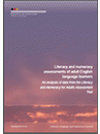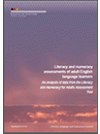This report is an attempt to answer questions about the extent to which the Assessment Tool can reasonably and legitimately be used to assess the literacy and numeracy of English language learners, on the basis of a descriptive study of skills (as measured by the Assessment Tool) of English language learners in comparison with learners with English as first language.
Key Results
Assessments of learners using the Literacy and Numeracy for Adults Assessment Tool were compared according to the learners’
- First language (English or other)
- Participation in the study of English for Speakers of Other Languages (ESOL)
- Enrolment in different types of tertiary education programme.
Assessment results for reading, writing and vocabulary consistently showed expected relationships with English language proficiency: the percentage of learners with low skills was greatest among ESOL learners, least among native English speakers, and at an intermediate level among learners with first language other than English who were not in ESOL study.
The percentage of native English speakers with low skills in reading, writing and vocabulary varied considerably between types of programme. The percentage of English language learners with low skills in reading, writing and vocabulary followed the same pattern of variation as native English speakers between types of programme.
These findings provide a strong indication that the Literacy and Numeracy for Adults Assessment Tool produces appropriate assessments of the literacy skills of those English language learners who were assessed.
However, numeracy results were variable. For some types of programme there was no difference between English language learners and native English speakers, while in others there were large differences. The pattern of variation in numeracy skills between types of programme for English language learners was somewhat different from the pattern of variation for native English speakers.
This means that it is unclear whether numeracy assessments can be used reliably with English language learners, and further investigation is needed to determine this.
On the other hand, English language learners and native English speakers showed similar rates of statistically significant gain in scores for the full range of skills, i.e. reading, writing, vocabulary and general numeracy.
English language learners (especially those in ESOL study) took longer in general to complete online versions of assessments than native English speakers, sometimes considerably longer. In so far as time taken is an indicator of effort expended in undertaking assessments, then English language learners could be said to experience greater difficulty than native English speakers.
A key limitation of the study is that large numbers of English language learners were not assessed, and it is not clear that these findings would apply to those learners who were not assessed.


